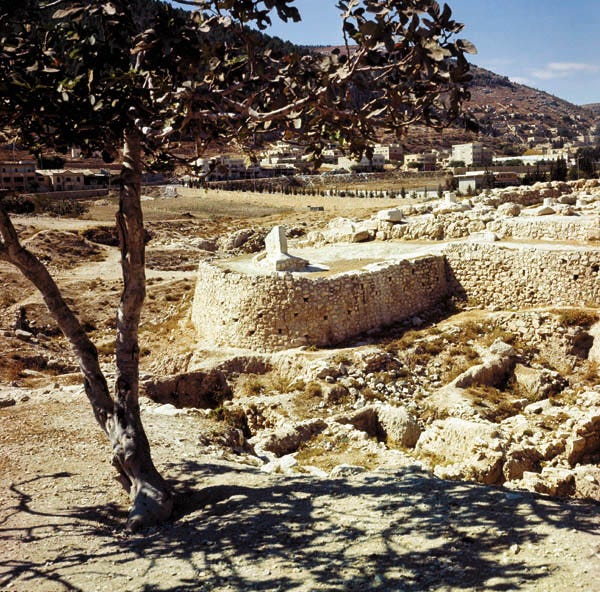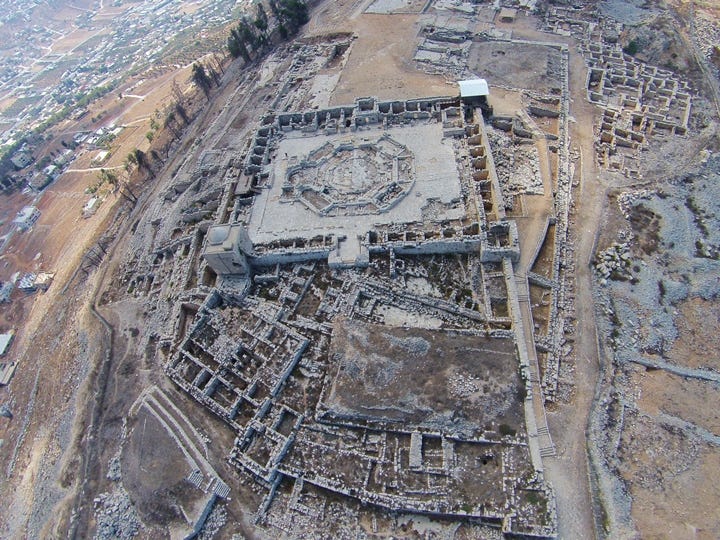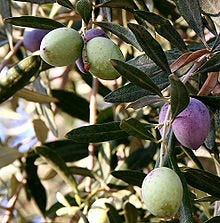Judges Chapter 9 Bible Study
A guy kills his brothers and gets hit by a falling rock
This is part nine of my Judges study. Read the previous parts here and watch for part ten coming on September 18.
This chapter begins the story of Abimelech, one of the sons of Gideon, who features prominently in the book of Judges despite never being a judge. It is interesting to note that the name “Gideon” is never used in the Abimlelech account, instead, he is only referred to as Jerubbaal.1 Abimelech went to speak to his mother’s family in Shechem and asked them which situation was better, them being ruled over by all of Gideon’s sons or exclusively by their relative Abimelech. These family members of Abimelech’s mother gave him money from the temple of Baal-berith which he used to hire mercenaries to help him gain political control.
At this point, Shechem was already a significant site in ancient Israelite history. Located some 50 km north of Jerusalem and 25 km west of the Jordan River, it is now sometimes known as Tell Balaṭa and inhabits an important location between mounts Ebal and Gerizim, near the modern-day city of Nablus.2 Shechem played an important role in the patriarchal narratives, having been visited by Abraham (Genesis 12:6) and Jacob (Genesis 33:18); it is also the central location in Genesis 34 and the place where Joseph’s brothers pastured their flocks (Genesis 37:12-14). Joshua also spoke to the tribes of Israel at Shechem (Joshua 14:1), and Joseph’s bones were buried there (Joshua 24:32). Furthermore, Shechem is mentioned in various other places in the Bible and lay on the border between the lands of Ephraim and Manasseh.3

Abimelech and his men headed back to his father’s hometown of Ophrah where they killed all of his half-brothers except Jotham, the youngest one, as he went into hiding. After this, the people of Shechem and Beth-millo gathered together and made Abimelech their king. While the meaning of Beth-millo is uncertain, it could have referred to a platform of earthen fill on which buildings were built.4 Jotham then climbed Mount Gerizim and called out to those down below, giving a speech. The attentive reader may notice that Mount Gerizim was the site where the blessings were proclaimed during the conquest of the land (Deuteronomy 11:29), so it is an ironic reversal that the mountain is used as a place for curses in this passage.5
In his monologue, he used a metaphorical story involving plants to describe what had happened with Abimelech and his brothers. The trees were looking for a king, so they asked multiple types of plants including the olive tree, the fig tree, and the grapevine to be their king, but all refused. Their reason for rejecting this offer is stated to be that they viewed the production of their fruit as a more essential vocation than ruling. Finally, the bramble accepted their offer, threatening to burn the trees if they were insincere about this. It has been noted that this “bramble” or “thornbush” was probably some type of thorny tree.6
Jotham said that if they had selected Abimelech as their king wisely, they would rejoice in him and do well, though if they had made this decision in vain, it would come back to haunt them later. Then he fled to escape Abimelech, hiding at Beer, which means “well.”7 Not only is the parable an illustration of Abimelech’s treacherous actions, but Jotham may have also used it to refer to Gideon’s refusal of kingship (see my study of chapter 8).8
The type of narrative Jotham used is an example of a fable, a popular type of story in the ancient world that personifies non-human entities. A narrative similar to the one in Judges 9 is a Babylonian one in which two different kinds of trees, the Tamarisk and the Date Palm, debate which one is greater than the other.9
After three years of Abimelech’s rule, the people of Shechem began to act deceitfully due to an evil spirit sent by God to create conflict. They ambushed and robbed travellers in the region before their activities were reported to Abimelech. When a man named Gaal son of Ebed came through Shechem with his brothers, the citizens of the town went into their fields to make wine and held a celebration. As they cursed Abimelech, Gaal told them they should remove Abimelech as king. He also used the tactic of employing his ancestry to gain favour with the Shechemites, claiming to be a descendant of Hamor, the father of Shechem.10
Zebul, the ruler of Shechem, heard this and told Abimelech what the people of Shechem were plotting with the help of Gaal. Abimelech then gathered his troops and set up an ambush just outside the town. Gaal saw the troops and informed Zebul of this development, though Zebul said that since Gaal had said such things about Abimelech, he should fight him.
Gaal and the citizens of Shechem fought against Abimelech’s troops, but Gaal ended up fleeing the battle. Meanwhile, Abimlelech travelled 8 km to Arumah, probably Khirbet el-ʿOrmeh.11 The next day, Abimelech and his troops captured the city and killed everyone in it. He “sowed it with salt,” something that could have been a literal action or just a figure of speech emphasizing the infertility of the land.12 They headed up to Mount Zalmon, gathering tree branches as they went which they set on fire and used to burn down the Tower of Shechem, killing everyone inside.
Next, Abimelech captured Thebez, forcing the town’s residents to gather in the tower there. Unfortunately, the location of this place is uncertain and there are varying theories.13 The reason for his attack on Thebez is unknown, as no explanation is given.14 Just as Abimelech was about to set fire to this tower, a woman on top of it dropped a portion of a millstone onto his head, causing him terrible injury. This “upper millstone” would have been a stone made of basalt or sandstone that was used by women and servants for grinding grain, around 2-5 kg in weight.15
Because Abimelech viewed it as incredibly embarrassing to be killed by a woman, he told his armour bearer to kill him with a sword, which the man did. His request parallels that of Saul in 1 Samuel 31:4, as both men would rather be killed by an ally instead of the enemy.16 Somewhat ironically though, it is this unnamed woman who is later remembered as being Abimelech’s killer, as in 2 Samuel 11:21, which reads, “At Thebez, who struck Abimelech son of Jerubbesheth? Didn’t a woman drop an upper millstone on him from the top of the wall so that he died?” After this, everyone went home, as God had punished both Abimelech and the people of Shechem who chose poorly in making him their king.
The story of Abimelech is certainly a negative example of leadership in ancient Israel. However, it is also a story about how ordinary people can fall prey to a manipulator if they fail to properly discern the individual’s character. Abimelech was a cunning man who used his family connections to establish himself as an authority figure in Shechem and the surrounding area. By not recognizing Abimelech’s red flags and poorly choosing to fund his reckless mission, the Shechemites unleashed a tyrant whose actions only ended up hurting them in the long term.
I hope you learned something through this study of Abimelech’s story in Judges. These Bible study posts go out once per month and I have found the research I do for them very informative and interesting, so it would mean a lot if you shared this with a friend to help spread free online Bible content that relies on evidence and credible scholarship. Thanks!
BIBLIOGRAPHY
Block, Daniel I. “Judges.” In Joshua, Judges & Ruth, edited by John H. Walton, 198-451. Zondervan Illustrated Bible Backgrounds Commentary Series. Grand Rapids, MI: Zondervan, 2009.
Boda, Mark J. “Judges.” In Judges, Ruth, edited by Tremper Longman III and David E. Garland, 30-347. The Expositor’s Bible Commentary Series. Grand Rapids, MI: Zondervan, 2012.
Evans, Mary J. Judges and Ruth. Tyndale Old Testament Commentaries Series. Downers Grove, IL: InterVarsity Press, 2017.
McCann, J. Clinton. Judges. Interpretation: A Bible Commentary for Preaching and Teaching Series. Louisville, KY: John Knox Press, 2011.
Way, Kenneth C. Judges and Ruth. Teach the Text Commentary Series. Grand Rapids, MI: Baker Books, 2016.
Webb, Barry G. The Book of Judges. The New International Commentary on the Old Testament Series. Grand Rapids, MI: William B. Eerdmans Publishing Company, 2012.
Younger Jr., K. Lawson. Judges and Ruth. The NIV Application Commentary Series. Grand Rapids, MI: Zondervan, 2002.
Boda, “Judges,” 202.
Webb, The Book of Judges, 279.
Way, Judges and Ruth, 125.
Block, “Judges,” 314.
Boda, “Judges,” 204.
Block, “Judges,” 316.
Ibid., 317.
Boda, “Judges,” 206.
Block, “Judges,” 315.
Webb, The Book of Judges, 290.
Ibid., 294.
Way, Judges and Ruth, 129.
Webb, The Book of Judges, 299.
Evans, Judges and Ruth, 111.
Younger, Judges and Ruth, 223; Way, Judges and Ruth, 130.
McCann, Judges, 86.







Rachel, this story always reminds me of certain things that inevitably happen in families, groups of people, and many more. I appreciate this reminder. Hope you’re well this week? Cheers, -Thalia
As I've been reading this today all I kept thinking about is our modern day politics and especially the ones circling around elections. I feel like the a godly person should consider a lesser focus on the strength and power of a candidate on the ballot and focus more on the godly ideals and values. It's quite unfortunate that, just like Abimaleck, most leaders we vote into office today are dragging the value of the entire nation down with their ungodly decisions.